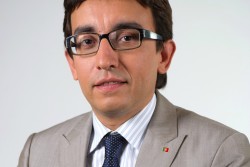Plenary panel 2: The New European Security Strategy: EU in a global world and its transatlantic partners
Discussion Points:
- The EU response to global crises: a strong and capable global player, or a fragmented and un-harmonised union?
- What are the biggest threats and what are the chances ahead of the EU in the new and changing global security architecture?
- How is the new security architecture in Europe affecting the relations between the EU member states, as well as the EU and its (potential) candidate countries?
- Strength in Unity: how can the EU respond efficiently and effectively to the terrorist threats?
- Home-grown terrorism, cyber security, energy supply and revolutionisation of the defence industry: is the EU ready for the new generation of security threats?
- How could the EU Global Strategy on foreign and security policy contribute to an even closer Union and a deeper collaboration of the EU with its neighbouring countries?
- New means for new realities: How can the EU Global Strategy on foreign and security policy bring an efficient, effective and consistent EU response to global changes?
Speakers:
Thomas Bagger‚ Head of Policy Planning, German Foreign Office
François Heisbourg‚ Chairman, International Institute for Strategic Studies (IISS)
Antonio Missiroli‚ Director, European Union Institute for Security Studies (EU ISS)
Amb. Cameron Munter‚ CEO and President, EastWest Institute
Bruno Maçães‚ Former Secretary of State for European Affairs, Portuguese Republic
Richard Whitman‚ Visiting Senior Fellow, Chatham House
Chair: Gordana Delić‚ Director, Balkan Trust for Democracy, German Marshall Fund of the United States
Background
The European Union is facing multifaceted changes. The global environment is rapidly shifting, from the instabilities and conflicts in Ukraine, Caucasus, Middle East and the north of Africa, terrorist threats and refugee crisis, to the emerging powers and security tensions in Asia and the development of a multipolar world of global stakeholders. As a result, the EU’s role and strength as a global player are being challenged. Moreover, the growing threats of terrorism along with emerging conflicts in the EU’s backyard are bringing new security issues on the top of EU’s agenda. These changes can bring an opportunity for deepening and strengthening EU’s policies and development of more coherent a unified response of its member states. However, the question is whether the EU can handle the intensity of these cumulating challenges in order to grow, develop and strengthen as a global player.
Over the past years, the EU’s response to these crises was far from harmonised. Already the Ukrainian crises challenged the architecture and institutions of European security, highlighting the slowness and the lack of consistency of EU member states’ response. The Ukrainian crisis was just the top of the iceberg. From its eastern neighbourhood, the new challenges are emerging along the southeast and south, with conflicts in Syria, Iraq and north of Africa, and even transcended inside the EU, with home-grown terrorism and mounting terrorist threats.
The massive migration flows revealed the weakness of EU border controls and asylum policies, lack of the coordination and strategic joint response of the EU member states, as well as the fragility of the Schengen Area. The horrifying terrorist attacks in Paris and Brussels tested the EU’s ability to tackle non-traditional threats while protecting the core values of the European lifestyle, and underlined the dangers of the lack of information sharing among the EU member states. On the other hand, they proved the necessity of a joint and coordinated EU action, as illustrated by the recent calls of the EC President Jean-Claude Juncker for a “Security Union” or by France’s bold move in the wake of the Paris attack – the first-time-ever invocation of the Article 42.7 of the Lisbon Treaty.
These changes of the security landscape offer the opportunity to use the new momentum in order to reinvent the outdated policies and approaches strengthen the EU and foster new partnerships in global order. Along these lines, the EU is currently in the process of a strategic reflection of its geopolitical position, choosing the way forward to deal with old and new crises and reinforce its place of an influential global player. As a result of the process, led by the High Representative of the Union for Foreign Affairs and Security Policy Federica Mogherini, a comprehensive EU Global Strategy on foreign and security policy will be prepared by June 2016.
However, all these global geopolitical and economic trends clearly demonstrate that the need for the transatlantic community to be firm in its commitment towards building secure environment has never been greater. Based on solidarity, cohesion, and the indivisibility of Euro-Atlantic security, the transatlantic framework proves essential for security consultations and effective responses to the current threats.
The expectations from the EU Global Strategy, as the first EU strategic document since the European Security Strategy 2003, are very high: it is envisaged as a common, comprehensive and consistent EU global strategy guiding the union through the new realities with a clear sense of direction. How can the EU Global Strategy live up to these expectations and forge a path toward efficient, effective and consistent EU responses to global changes? And what implications will the new EU foreign and security policy have for the candidate countries and potential candidates from the Western Balkans?
———————————————————-
Selected Readings:
- The European Union in a changing global environment: A more connected, contested and complex world (Background research by EEAS)
- Joint Communication to the European Parliament, the Council, the European Economic and Social Committee and the Committee of the Regions: Review of the European Neighbourhood Policy (European Commission, HR of the Union for Foreign Affairs and Security Policy, Brussels, November 2015)
- Joint Consultation Paper: Towards a new European Neighbourhood Policy (European Commission, HR of the Union for Foreign Affairs and Security Policy, Brussels, March 2015)
- Towards an EU global strategy – Background, process, references Ed. by Antonio Missiroli (EU Institute for Security Studies, Paris, 2015)
- Gavas, M., Hackenesch, C., Koch, S., Mackie, J., Maxwell, S; The European Union’s Global Strategy: putting sustainable development at the heart of EU external action (European Think Tanks Group, January 2016)
- Dennison, S., Godement, F., Gowan, R., Levy, D., Liik, K., Shapiro, J., Witney, N.; The road back to European power (ECFR Policy Brief, July 2015)
- Nick Witney and Dennison, Susi; Europe’s Neighbourhood: Crisis as the new normal (ECFR Policy Memo, June 2015)
- Antonio Missiroli, Stang, Gerald et al.; A changing global environment (ISS UE CHAILLOT PAPER Nº 133, December 2014)
Previous BSF Panels and Sessions on the topics of security and Europe as a global player:
2015
Academic Session – Does the EU need a Foreign Policy?
Session 4: Countering the Tide of Radicalization: In Search of a Comprehensive Response
Session 9: The Russian Dilemma: What Kind of International Order is Russia Seeking?
2014
Plenary Panel 1: Opening the New Strategic Debate Between Transatlantic and Eurasian Agendas
Session 7: Will the Outcome of the Ukrainian Crisis Determine a New Path for Europe and Beyond?
2013
Session 1: Overcoming the Gaps in Security Cooperation in the Western Balkans
Session 8: Rethinking the EU’s Mediterranean Policies: Europe’s Security Shortcomings
2012 – Thematic discussion 2: China’s New Role in a World in Crisis
Useful websites:







